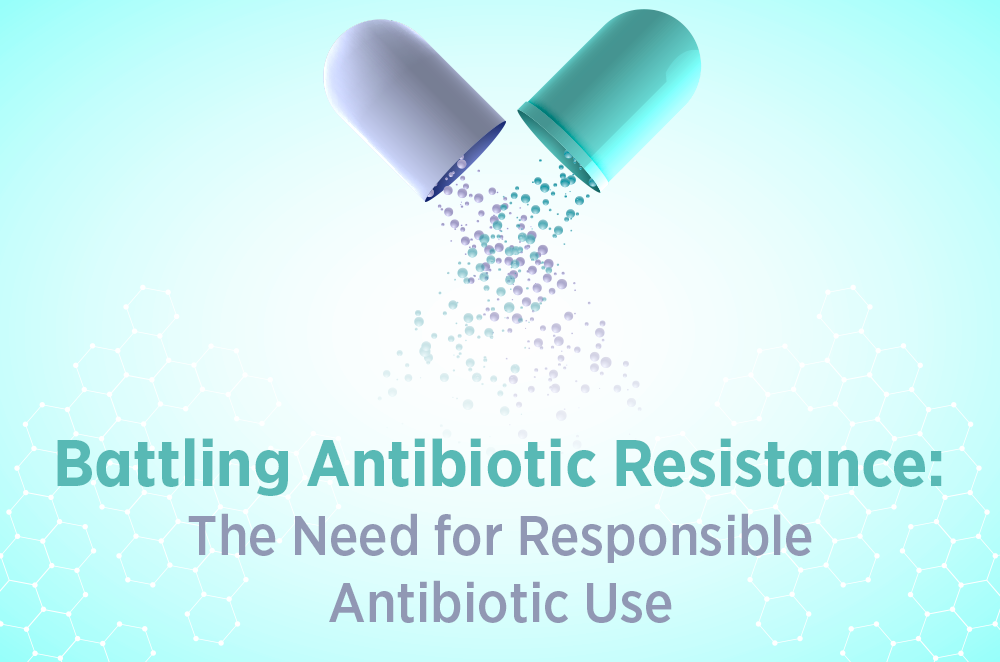During Antibiotic Awareness Week, it’s the perfect time to talk about the responsible use of antibiotics and the growing issue of antibiotic resistance. Antibiotics have been nothing short of miraculous. Since the discovery of penicillin by Alexander Fleming in 1928, these powerful drugs have played an important role in treating bacterial infections and saving countless lives. However, their overuse and misuse have given rise to a global health crisis – antibiotic resistance.
Understanding Antibiotic Resistance
According to the CDC, antibiotic resistance poses a pressing global public health threat, killing at least 1.27 million people worldwide and associated with nearly 5 million deaths in 2019. In the U.S., more than 2.8 million antimicrobial-resistant infections occur each year. More than 35,000 people die as a result, according to CDC’s 2019 Antibiotic Resistance (AR) Threats Report.
Antibiotic resistance occurs when bacteria evolve and develop mechanisms to withstand the effects of antibiotics. This happens when these drugs are used inappropriately or excessively, allowing the bacteria to adapt and survive. The consequences are dire: common infections that were once easily treatable become difficult adversaries, leading to prolonged illness, increased healthcare costs, and, in severe cases, death.
The Root Causes of Antibiotic Resistance
Overprescription:
Overprescribing antibiotics is a major contributor to antibiotic resistance. There are some healthcare providers that may prescribe antibiotics unnecessarily. However, CCMH providers are well-informed and proficient in prescribing antibiotics when necessary. Patients can feel assured that their CCMH healthcare team is equipped to make sound decisions about their treatment.
Incomplete Courses:
Not finishing a prescribed antibiotic course is a factor that adds to resistance. People frequently stop taking antibiotics once they start feeling better, giving surviving bacteria the chance to develop resistance. It’s crucial to adhere to healthcare providers’ instructions and finish the entire antibiotic course.
Self-Medication:
Easy access to antibiotics may encourage self-medication, a habit that plays a substantial role in contributing to resistance. It’s crucial for individuals to avoid the temptation of self-prescribing and instead always seek professional medical advice.
The Importance of Responsible Antibiotic Use
Preserving Effectiveness:
Using antibiotics responsibly is crucial to maintaining their effectiveness. When antibiotics are used only when necessary and according to prescribed guidelines, we contribute to slowing down the development of resistance. This practice ensures that these medications continue to be powerful weapons in the battle against bacterial infections.
Reducing Spread of Resistance:
It’s important for all of us to use antibiotics responsibly, and it’s not just an individual duty but a shared responsibility. When we collectively decrease the overall use of antibiotics, we actively work towards minimizing the chances of resistant strains emerging and spreading within our community.
Supporting Research and Development:
Using antibiotics responsibly is closely linked to backing the research and development of novel antibiotics. With the rise of resistance, there is an increasingly urgent need for innovative treatments. Therefore, it’s essential for governments, pharmaceutical companies, and the public to come together, fostering encouragement and investment in the exploration of new antibiotics.
Navigating the complex landscape of antibiotic resistance requires reliable information and expert guidance. Our dedicated team of medical providers is well-equipped to offer top-notch advice and treatment. If you find yourself in need of medical assistance or simply seek more information on antibiotic resistance, don’t hesitate to connect with us. Schedule an appointment conveniently through CCMH’s Find A Provider tool online, ensuring access to the expertise needed for your health concerns. Your well-being is our priority, and we’re here to provide the information and care you require.
Resources:
https://www.cdc.gov/drugresistance/usaaw/
https://www.cdc.gov/drugresistance/biggest-threats.html
Disclaimer
The Comanche County Memorial Hospital website does not provide specific medical advice for individual cases. Comanche County Memorial Hospital does not endorse any medical or professional services obtained through information provided on this site, articles on the site or any links on this site.
Use of the information obtained by the Comanche County Memorial Hospital website does not replace medical advice given by a qualified medical provider to meet the medical needs of our readers or others.
While content is frequently updated, medical information changes quickly. Information may be out of date, and/or contain inaccuracies or typographical errors. For questions or concerns, please contact us at contact@ccmhhealth.com.

